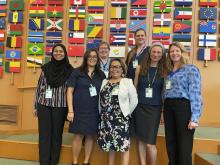POPRC19 Interventions
Opening intervention on Long-chain PFCAs
Presented by Dr. Sara Brosché, October 9, 2023
Thank you, Mr Chair.
First of all, for those of you don´t know IPEN, we´re a global network of public interest, civil society organizations in more than 125 countries.
Thank you to the drafters and working group for the hard work preparing this comprehensive Risk Management Evaluation.


